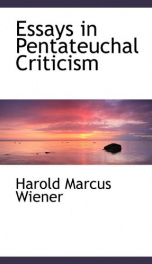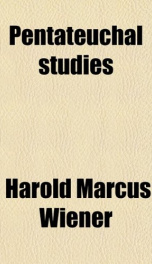essays in pentateuchal criticism

Purchase of this book includes free trial access to www.million-books.com where you can read more than a million books for free. This is an OCR edition with typos. Excerpt from book: or determining criterion: in xvi. the use of the Tetragrammaton in verse 2 compels Mr. Carpenter to wrench Ib and 2 from a P context and assign them to J; in xix., verse 29 is torn from a J chapter in which it fits perfectly, to be given to P; in xx. the last verse is assigned to a redactor, though all the rest of the chapter goes to E, and the verse is required for the explanation of 17; in xxii., verses 14-18 go to redactors because the story is assigned to E (a redactor being responsible for the Tetragrammaton in 11). An even more flagrant instance occurs in xxviii. 21, where Mr. Carpenter is compelled to scoop out the words " and the Lord will be my God " and assign them to J, the beginning and end of the verse going to E. What manner of man was this redactor who constructed a narrative on these strange principles? In xxxi., verse 3 has to go to a redactor because the preceding and subsequent verses belong to E; yet that gentleman actually postulates the redactor's work by referring to the statement of 3 in verse 5. However, he receives compensation in xxxii., where verse 30 is wrenched from a J context for his enrichment, though verse 31 (J) cannot be understood without it. During the later chapters there are no instances, because the Tetragrammaton occurs in Genesis only once after xxxix. 23, so that " a peculiar revision " has to be postulated to justify the analysis during the remainder of the book. It must be remembered further that we have confined ourselves to flagrant cases where the Divine appellations are the sole or determining criterion: there are others where it is one of the criteria (e.g. the assignment of v. 29, the division of the flood story). It will be felt that the critics must have been very hard up for something to believe before they credited such th... --This text refers to an alternate Paperback edition.
Info about the book
Author:
Series:
Unknown
ASIN:
B004FJ3ZCC
Rating:
4.5/5 (1)Your rating:
0/5
Languge:
English
Users who have this book
Users who want this book
What readers are saying
What do you think? Write your own comment on this book!
write a commentif you like essays in pentateuchal criticism try:
Other books by this author
Do you want to exchange books? It’s EASY!
Get registered and find other users who want to give their favourite books to good hands!



